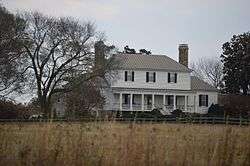Spring Bank (Lunenburg Courthouse, Virginia)
|
Spring Bank | |
 Roadside view | |
  | |
| Location | 1070 Courthouse Rd., near Lunenburg, Virginia |
|---|---|
| Coordinates | 36°52′12″N 78°24′38″W / 36.87000°N 78.41056°WCoordinates: 36°52′12″N 78°24′38″W / 36.87000°N 78.41056°W |
| Area | 150 acres (61 ha) |
| Built | c. 1793 |
| Built by | Jacob Shelor; John Inge |
| Architectural style | Georgian |
| NRHP Reference # | 07000825[1] |
| VLR # | 055-0017 |
| Significant dates | |
| Added to NRHP | August 16, 2007 |
| Designated VLR | June 6, 2007[2] |
Spring Bank, also known as Ravenscroft and Magnolia Grove, is a historic plantation house located near Lunenburg, Lunenburg County, Virginia. It was built about 1793, and is a five-part Palladian plan frame dwelling in the Late Georgian style. It is composed of a two-story, three-bay center block flanked by one-story, one-bay, hipped roof wings with one-story, one-bay shed-roofed wings at the ends. Also on the property are the contributing smokehouse, a log slave quarter, and frame tobacco barn, and the remains of late-18th or early-19th century dependencies, including a kitchen/laundry, ice house, spring house, and a dam. Also located on the property are a family cemetery and two other burial grounds. It was built by John Stark Ravenscroft (1772–1830), who became the first Bishop of the Episcopal Diocese of North Carolina, serving from 1823-1830.[3]
It was listed on the National Register of Historic Places in 2007.[1]
References
- 1 2 National Park Service (2010-07-09). "National Register Information System". National Register of Historic Places. National Park Service.
- ↑ "Virginia Landmarks Register". Virginia Department of Historic Resources. Retrieved 5 June 2013.
- ↑ Kimberly M. Chen and Hannah Collins (n.d.). "National Register of Historic Places Inventory/Nomination: Spring Bank" (PDF). Virginia Department of Historic Resources. and Accompanying photo

